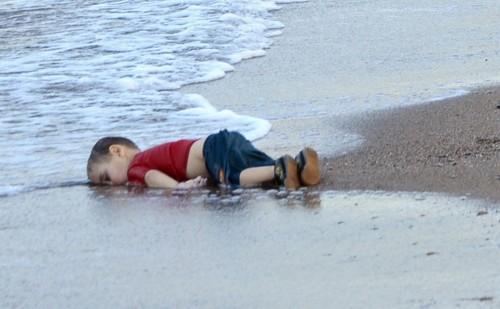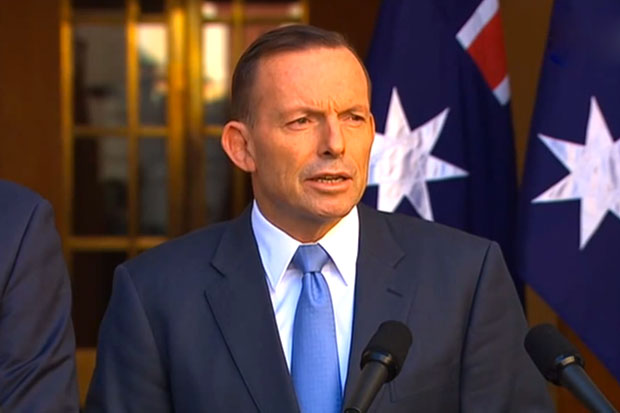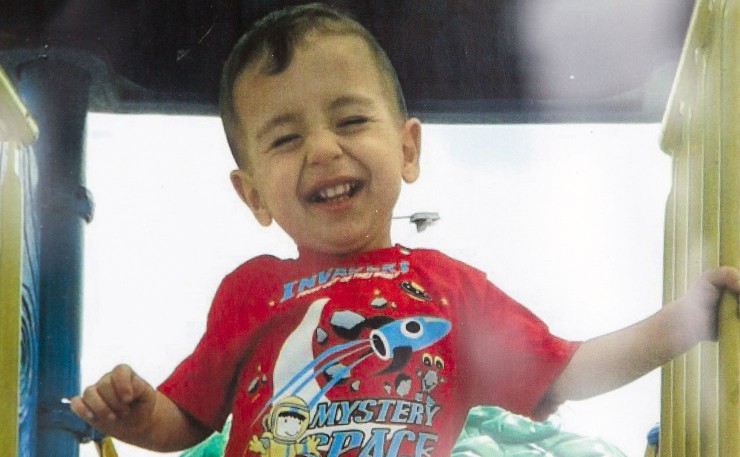“LET THEM IN” proclaimed Melbourne’s Herald Sun this morning, a newspaper normally known for its hawkish approach to migrants and borders.
Breathtaking hypocrisy? Or a sign of the times? Murdoch Herald Sun shows just how the asylum seeker debate has moved pic.twitter.com/m63cZ8ZGwm
— Ben Eltham (@beneltham) September 7, 2015
The newspaper carried a front page article reporting positively on yesterday’s Light the Dark rally in central Melbourne, in which more than 10,000 Melburnians lit candles in solidarity with the refugees fleeing Syria’s devastating civil war. On Channel Seven yesterday, Prime Minister Tony Abbott told viewers that he and his government are “going to do more.”
“In the last year, we took almost 4,500 people from this conflict,” he told Seven’s Samantha Armytage. “We have got the Immigration Minister in Europe right now to talk about what more we can do with the UN High Commissioner for Refugees – and we will do more.”
The Abbott government is advocating compassion. Peter Dutton is in Switzerland. Truly, these are interesting times. Abbott is reacting to public sentiment. The public mood about refugees in Australia, indeed perhaps in many western countries, has suddenly and dramatically altered, to the surprise of many politicians and media observers.
There can be no doubt what has driven this change. It was the publication of two photographs of the drowned, lifeless Aylan Kurdi, a three-year old Syrian boy. What can explain the outpouring of grief and compassion that those photographs have provoked, except the extraordinary power of those images?

Certainly we knew, or should have known, about the perils of refugee movement and the horror of the Syrian civil war. But somehow, perhaps understandably, it had been easy for too many to look away. Only the searing intensity of the images themselves explains the peculiar and dramatic effect they seem to have had on western opinion.
The press of events has also persuaded. The scenes at Keleti Station in Budapest over the weekend spoke of crisis and despair. Refugees headed for Austria and Germany were locked out of the train station, then herded into special trains and sent towards camps. Eventually, most were allowed to head back towards Austria and Germany; others set out on foot.
Australians, believing ourselves immune to the horrors of the Syrian conflict, could pretend no more. The rolling crisis in Hungary, and its ramifications in Austria, Germany and the world more broadly, showed us that global events can rapidly overwhelm the fantasies of “border security” entertained by politicians and generals.
Despite racing to build a barbed-wire fence across his border, Hungary’s right-wing prime minister, Viktor Orbán, has been unable to stop hundreds of thousands of migrants cross his border on the way to Austria and Germany. By Monday, Austria was already saying it would close its borders again, while Germany was criticising other European nations for not doing more.
France and Germany want the EU to take 160,000 asylum seekers this year. They are already flowing into Austria and Germany: the state president of Upper Bavaria has said that Munich will receive 13,000 and 11,000 refugees on consecutive days, and that “Munich was running out of capacity.” Yesterday, Hungarian police were still rounding up asylum seekers.
Some have gone to the petrol station up road to be smuggled to Budapest. But immobile families stuck here. A pic pic.twitter.com/Ryqljqnd4J — Patrick Kingsley (@PatrickKingsley) September 7, 2015
The scale of this unstoppable flow of people is astounding. It is now beginning to resemble the mass refugee movements of the post-Second World War era. The UNHCR says there were 59 million people displaced, as of the end of 2014. In June, the UN High Commissioner for Refugees, António Guterres, warned that “we are witnessing a paradigm change, an unchecked slide into an era in which the scale of global forced displacement, as well as the response required, is now clearly dwarfing anything seen before.”
There are an estimated 11.6 million Syrians displaced by the conflict. Most of them are trapped inside the imploding former Syrian state, but more than 4 million have fled Syria for safety in other countries.
This wave of desperate people has crashed down on Syria’s neighbours. There are 1.1 million in Lebanon, 630,000 in Jordan, 250,000 in Iraq, 132,000 in Egypt, and 1.9 million in Turkey. Of course, migrants are moving on from these first refuges, towards a better life for themselves and their children. Many want to move to first world nations.
This lethal cocktail of push and pull is creating the conditions for tragedy, as it so often has in our own region. The sea lanes through the Mediterranean have carried another 300,000 this year, most to Greece and Italy. Many thousands have drowned, like Aylan Kurdi and his brother Galip.
In this way, the global emergency that is Syria’s refugee crisis has finally hit home to Australians, with the horrifying immediacy of a drowned boy.
Who would have thought that public opinion could shift so suddenly, and so decisively?
Australian debate has so far barely engaged in the grisly details of the Syrian conflict. There is little understanding amongst the public or even in our political media of the violence of Syria’s chaotic implosion. This complex crisis has quickly made very strange bedfellows.
In just a few short years, Australia, a nation with no true strategic interest in the conflict in question, has nonetheless moved from being a fervent opponent of the Bashar al-Assad regime to contemplating bombing Islamic State forces in Assad’s support.

It’s a measure of the muddled thinking that passes for grand strategy in the Abbott cabinet that Australia is considering escalating a bombing campaign into the very heart of the Syrian conflict. It’s hard to see, even from a purely military perspective, what extra air power will contribute. The massive firepower of the United States has so far proved conspicuously ineffective at halting the advance of IS.
Strategically, Australia must now confront the uncomfortable reality that we are about to become a de facto ally of Assad. Perhaps that is merely consistent – Tony Abbott has tacitly supported the brutal dictatorship of General Sisi in Egypt. And Australia is already bombing IS in Iraq, so we can already be said to be fighting the common enemy of the Syrian regime.
What would Australia have done if Aylan and Galip Kurdi had somehow got in a boat and made it to Christmas Island? We would have locked them up in an island jail, places where people are murdered and children are sexually abused.
Whatever their sudden discovery of compassion, neither the Coalition nor the Labor Party show any sign of abandoning offshore detention.
Nor is Australia demonstrating much generosity in the aggregate. The Abbott government granted less than 14,000 humanitarian visas last year. So far, the government has said that it won’t even increase that total figure, but merely to allow more Syrians in as part of that total.
Labor announced it wanted an extra 10,000 humanitarian places – still just a drop in the ocean of fathomless need.
Many believe the figure should be much higher. New South Wales Premier Mike Baird wondered if it should be more. “Who’s to say we can’t do more?” he asked on the ABC’s Q and A last night. Indeed, it’s a fascinating aspect of the rapid public shift on refugees that suddenly politicians are racing themselves back up the slippery slope, towards a more generous refugee policy.
Many will be tempted to call this a permanent shift in the public mood on refugees and borders, but I’m not so sure. Dark voices of fear and loathing continue to haunt Australia’s public sphere. Just today, both Pauline Hanson and Cory Bernardi attacked refugees and looser immigration policies.
Hanson warned Tony Abbott today that “he will face a backlash if he takes a lot of these people in.”
It was perhaps inevitable that Hanson returned to the public debate on this most vexed of contemporary political questions. In many ways the Australian public sphere is still reeling from the injury sustained by the eruption of Hansonism in the Howard years.
The politics of immigration remains as potent as it is volatile. For Australia to truly embark on a more generous refugee policy, we will require leadership from the politicians we elect to represent us. Recent history would not give much hope for optimism.
But at least we can put one cherished myth to bed: the idea that ordinary Australians are selfish and xenophobic. If the events of the past few days have shown anything, it is that when given the chance, most of us are far more generous than we realise.
That’s something the Australian Labor Party, in particular, would do well to remember.
Donate To New Matilda
New Matilda is a small, independent media outlet. We survive through reader contributions, and never losing a lawsuit. If you got something from this article, giving something back helps us to continue speaking truth to power. Every little bit counts.





